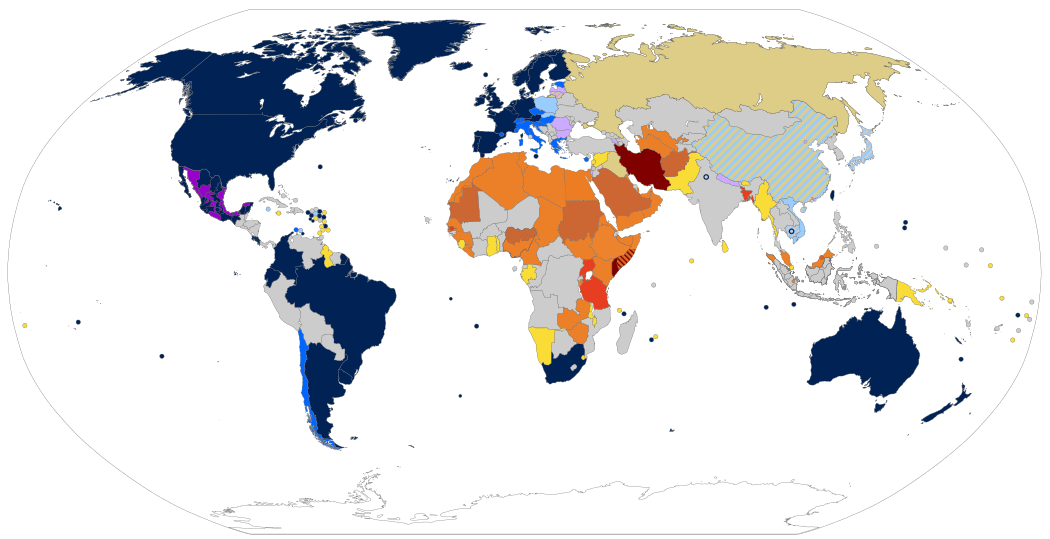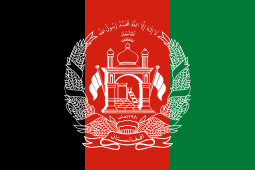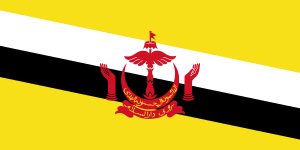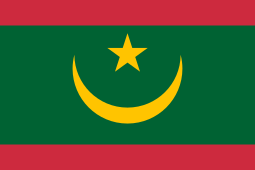Capital punishment for homosexuality
Capital punishment for homosexuality was historically implemented by a number of countries worldwide. It currently remains a legal punishment in several countries and regions, all of which have sharia-based criminal laws. Being prescribed by the law does not necessarily mean that the penalty is carried out in practice. Gay people have also faced extrajudicial killings by state and non-state actors.
| Part of a series on |
| LGBT rights |
|---|
 |
| lesbian ∙ gay ∙ bisexual ∙ transgender |
|
Overview
|
|
Organizations
|
|
|
In current state laws

As of 2020, the following jurisdictions prescribe the death penalty for homosexuality:









.svg.png)




Extrajudicial killings
In some regions, gay people have been murdered by Islamist militias, such as ISIS in parts of Iraq and Syria and the Houthi movement in Yemen.[6]
Anti-gay purges in the Chechen Republic, a part of the Russian Federation, have included forced disappearances — secret abductions, imprisonment, and torture — by authorities targeting persons based on their perceived sexual orientation. An unknown number of men, who authorities detained on suspicion of being gay or bisexual, have reportedly died after being held in what human rights groups and eyewitnesses have called concentration camps.[17][18]
Report of vigilante executions, beatings, and torture[19][20][21][22] have been reported in highly religious regions of Africa. In these countries, police turn a blind eye[23][24] or even are complicit in the anti-gay violence[25].
History
Australia
Australian states and territories inherited British laws relating to homosexuality, and laws passed in nineteenth century colonial parliaments retained the provisions which made homosexual activity a capital crime until 1861.[26] Most jurisdictions removed capital punishment, although in Victoria it remained a capital crime when committed with violence or to a person younger than the age of fourteen until 1949.[26] The last person arrested for homosexual sex in Australia was a man in 1984 in Tasmania.[27] The last part of Australia to legalise consensual homosexual sex between adults was Tasmania in 1997. In 2017, homosexual marriage was legalised.
Nazi Germany
Despite numerous countries in Europe, the Americas and Asia beginning to decriminalise homosexuality by the mid 20th century, Adolf Hitler and his Nazi Party, with intense far-right nationalist support, outlawed homosexual groups and included homosexuals as one of the minority groups sent to death camps. An estimated 3000-9000 homosexuals died in concentration camps between 1933 and 1945, with another 2000-6000 survivors made to serve the rest of their sentence in prison under Paragraph 175.
United Kingdom
From 1533 the capital felony for any person to "commit the detestable and abominable vice of buggery with mankind or beast", was repealed and re-enacted several times, until it was reinstated in 1563 remaining unchanged until 1861.[28] The last execution took place on 27 November 1835 when James Pratt and John Smith were hanged at Newgate.
One source claims the last execution for sodomy in the British Empire happened in the Colony of Tasmania (now part of Australia) in 1867.[29]
United States and colonial America
Colonial America had the laws of the United Kingdom, and the revolutionary states took many of those laws as the basis of their own, in some cases verbatim.[28] The last law where the death penalty was on the statute books was South Carolina, the old British law was not repealed until 1873, twelve years after the mother country.[28]
The number of times the penalty was carried out is unknown. Records support two executions, and a number of more uncertain convictions, such as "crimes against nature".[28]
References
- Mendos, Lucas Ramón (2019). State-Sponsored Homophobia 2019 (PDF). Geneva: ILGA. p. 429.
- "Here are the 10 countries where homosexuality may be punished by death". The Washington Post. 16 June 2016. Retrieved 25 August 2017.
- "The Death Penalty in Afghanistan". Death Penalty Worldwide. Retrieved 25 August 2017.
- correspondent, Hannah Ellis-Petersen South-east Asia (2019-03-28). "Brunei introduces death by stoning as punishment for gay sex". The Guardian. ISSN 0261-3077. Retrieved 2019-03-28.
- "Brunei says it won't enforce gay death penalty after backlash". Reuters. Retrieved August 19, 2019.
- Aengus Carroll; Lucas Paoli Itaborahy (May 2015). "State-Sponsored Homophobia: A World Survey of Laws: criminalisation, protection and recognition of same-sex love" (PDF). International Lesbian, Gay, Bisexual, Trans and Intersex association. Retrieved April 5, 2019.
- Asal, V.; Sommer, U. Legal Path Dependence and the Long Arm of the Religious State: Sodomy Provisions and Gay Rights Across Nations and Over Time. State University of New York Press. p. 64.
- "How homosexuality became a crime in the Middle East". The Economist. June 6, 2018.
- Bearak, Max; Cameron, Darla (16 June 2016). "Analysis - Here are the 10 countries where homosexuality may be punished by death". The Washington Post.
Lawyers in the country and other experts disagree on whether federal law prescribes the death penalty for consensual homosexual sex or only for rape. In a recent Amnesty International report, the organization said it was not aware of any death sentences for homosexual acts.
- Mendos, Lucas Ramón (2019). State-Sponsored Homophobia 2019 (PDF). Geneva: ILGA. p. 347.
- Mendos, Lucas Ramón (2019). State-Sponsored Homophobia 2019 (PDF). Geneva: ILGA. p. 359.
- Mendos, Lucas Ramón (2019). State-Sponsored Homophobia 2019 (PDF). Geneva: ILGA. p. 465.
- "UAE Penal Code" (PDF). ADJD.gov.ae. Retrieved 1 February 2020.
- Lucas Ramón Mendos (2019). "State-Sponsored Homophobia" (PDF). International Lesbian, Gay, Bisexual, Trans and Intersex association (13th ed.). p. 479. Retrieved February 7, 2020.
However, it is through the Sharia code that the death penalty theoretically can apply to same-sex sexual relations through the offence of Zina, which applies to sexual relations outside of marriage of any sort. However, it appears that the law is used in rape cases only although in some cases courts have gone beyond codified laws and imposed harsher sentences of stoning and flogging for Zina crimes.
- "GayLawNet®™ | Laws | Yemen | YE". www.gaylawnet.com.
- "No Place for Gays in Yemen | Inter Press Service". www.ipsnews.net.
- Smith, Lydia (10 April 2017). "Chechnya detains 100 gay men in first concentration camps since the Holocaust". International Business Times UK. Retrieved 16 April 2017.
- Reynolds, Daniel (10 April 2017). "Report: Chechnya Is Torturing Gay Men in Concentration Camps". The Advocate. Retrieved 16 April 2017.
- Rice, Xan (2011-01-27). "Ugandan gay rights activist David Kato found murdered". The Guardian. ISSN 0261-3077. Retrieved 2019-08-01.
- https://tbinternet.ohchr.org/Treaties/CCPR/Shared%20Documents/GHA/INT_CCPR_ICO_GHA_21415_E.pdf
- United States Department of State, Bureau of Democracy, Human Rights and Labor (2012). "LIBERIA 2012 HUMAN RIGHTS REPORT" (PDF). state.gov. Retrieved 2019-08-01.
- "Senegal: Gay Couple Brutally Assaulted by Parents". archive.globalgayz.com. Retrieved 2019-08-01.
- https://tbinternet.ohchr.org/Treaties/CCPR/Shared%20Documents/GHA/INT_CCPR_ICO_GHA_21415_E.pdf
- "Cameroonian LGBTI activist found tortured to death in home". GLAAD. 2013-07-17. Retrieved 2019-08-01.
- http://blogs.cuit.columbia.edu/rightsviews/files/2015/03/The-Being-LGBT-in-West-Africa-Project-Final-Report.pdf
- Carbery, Graham (2010). "Towards Homosexual Equality in Australian Criminal Law: A Brief History" (PDF) (2nd ed.). Australian Lesbian and Gay Archives Inc. Cite journal requires
|journal=(help) - "Toonen v. Australia, Communication No. 488/1992, U.N. Doc CCPR/C/50/D/488/1992 (1994)". hrlibrary.umn.edu. Retrieved 2019-10-08.
- Louis Crompton (1976). "Homosexuals and the Death Penalty in Colonial America". Journal of Homosexuality. 1 (3): 277–293. doi:10.1300/j082v01n03_03. Retrieved 20 May 2016.
- "Homosexuality". www.utas.edu.au. Retrieved 2019-08-01.